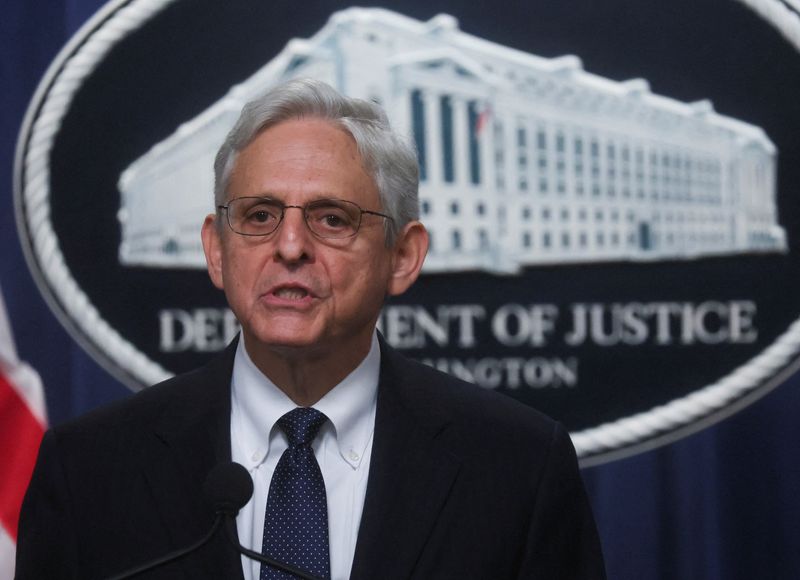By Sarah N. Lynch and Nate Raymond
WASHINGTON (Reuters) -Political appointees at the U.S. Justice Department will be barred from attending campaign events or fundraisers, according to new guidance issued by U.S. Attorney General Merrick Garland on Tuesday ahead of November's midterm elections.
Federal employees are subject to the Hatch Act, a law limiting some political activities to keep the government free from partisan influence.
However, while political appointees were previously permitted to attend partisan events in their personal capacity with approval, under the new guidance there will be no exceptions - including on Election Day itself.
"I know you agree it is critical that we hold ourselves to the highest ethical standards to avoid even the appearance of political influence as we carry out the Department's mission," Garland wrote in his memo https://www.justice.gov/jmd/page/file/1529516/download.
While it is common for the Justice Department to remind its staff to tread carefully about political activities ahead of election seasons, Garland's memo contains among the most restrictive policies in recent times.
Political appointees will also be prohibited from attending campaign events even if they have close family members running for office.
The change came after the U.S. Office of Special Counsel, a government watchdog agency, opened an investigation into whether Massachusetts U.S. Attorney Rachael Rollins (NYSE:ROL) violated the Hatch Act by attending a July Democratic fundraiser featuring First Lady Jill Biden, according to a document seen by Reuters.
The investigation came at the urging of Republican Senator Tom Cotton of Arkansas, a critic of the outspoken progressive prosecutor.
Rollins in a tweet following news reports on her attendance said she had "approval to meet Dr. Biden & left early to speak at 2 community events." A spokesperson for Rollins declined to comment.
Tuesday's change in policy also comes at a time when the Justice Department is under a national microscope over its extraordinary decision to search the Florida estate of former Republican President Donald Trump earlier this month as part of an ongoing criminal investigation into whether he illegally retained government records, including some marked as top secret.
Trump has accused the FBI of a partisan witch-hunt, and his rhetoric led one of his supporters to attack an FBI field office in Ohio earlier this month before later dying in a shoot-out with police.
The Justice Department responded to Trump's political attacks by publishing the search warrant and a redacted copy of the affidavit outlining its evidence.

The documents show Trump retained highly classified records at his home in Mar-a-Lago after leaving office in January 2021, some of which involve the country's most closely-held secrets about confidential human sources and intelligence gathering.
The FBI located more sets of classified records during its Aug. 8 search.